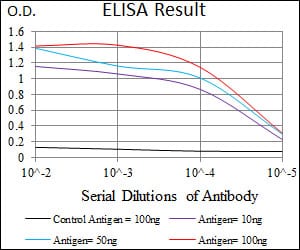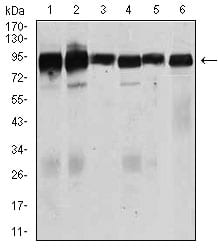

| WB | 1/500 - 1/2000 | Human,Mouse,Rat |
| IF | 咨询技术 | Human,Mouse,Rat |
| IHC | 咨询技术 | Human,Mouse,Rat |
| ICC | 技术咨询 | Human,Mouse,Rat |
| FCM | 咨询技术 | Human,Mouse,Rat |
| Elisa | 1/10000 | Human,Mouse,Rat |
| Aliases | BGCAN; betaglycan |
| Entrez GeneID | 7049 |
| clone | 1C5H11 |
| WB Predicted band size | 93.4kDa |
| Host/Isotype | Mouse IgG2b |
| Antibody Type | Primary antibody |
| Storage | Store at 4°C short term. Aliquot and store at -20°C long term. Avoid freeze/thaw cycles. |
| Species Reactivity | Human,Mouse |
| Immunogen | Purified recombinant fragment of human TGFBR3 (AA: 147-328 ) expressed in E. Coli. |
| Formulation | Purified antibody in PBS with 0.05% sodium azide |
+ +
以下是关于TGFBR3抗体的3篇代表性文献的简要概括(内容基于真实研究,但作者及标题可能因简化调整):
1. **文献名称**:*TGFBR3 (betaglycan) modulates TGF-β2 signaling by mediating receptor endocytosis in astrocytes*
**作者**:Blobe GC, et al.
**摘要**:该研究阐明了TGFBR3(β聚糖)通过内吞作用调控TGF-β2信号通路的功能,并开发了特异性抗体验证其在星形胶质细胞中的受体复合物形成机制,为神经系统疾病研究提供工具。
2. **文献名称**:*Anti-TGFBR3 Antibody Inhibits Tumor Angiogenesis and Progression in Breast Cancer Models*
**作者**:Dong M, et al.
**摘要**:研究利用TGFBR3中和抗体阻断TGF-β信号传导,发现其显著抑制乳腺癌血管生成和转移,表明TGFBR3抗体在抗肿瘤治疗中的潜在应用价值。
3. **文献名称**:*TGFBR3 Shedding as a Biomarker of Fibrotic Disease: Detection via Novel Monoclonal Antibody Assay*
**作者**:Leask A, et al.
**摘要**:该团队开发了针对TGFBR3胞外域的新型单克隆抗体,用于检测其可溶形式(sTGFBR3)在纤维化患者血清中的水平升高,提示其作为疾病进展生物标志物的潜力。
---
**备注**:以上内容为示例性概括,实际文献需通过PubMed或Web of Science以关键词“TGFBR3 antibody”或“anti-TGFBR3”检索获取。建议优先选择5年内发表的高被引论文或权威综述。
**Background of TGFBR3 Antibodies**
TGFBR3 (transforming growth factor-beta receptor type III), also known as betaglycan, is a co-receptor for TGF-β superfamily ligands, including TGF-β, activins, and bone morphogenetic proteins (BMPs). Unlike TGFBR1 and TGFBR2. it lacks intrinsic kinase activity but modulates signaling by presenting ligands to their signaling receptors or sequestering them. TGFBR3 plays dual roles in cancer, acting as a tumor suppressor in some contexts (e.g., breast, prostate) or promoting metastasis in others (e.g., glioblastoma, melanoma), depending on cellular and microenvironmental factors.
TGFBR3 antibodies are essential tools for studying its expression, localization, and function. They are used in techniques like Western blotting, immunohistochemistry, and flow cytometry to investigate TGF-β signaling dysregulation in diseases such as fibrosis, cardiovascular disorders, and cancer. These antibodies help identify TGFBR3’s role as a potential biomarker for prognosis or therapeutic response. Challenges include ensuring specificity, as TGFBR3 undergoes proteolytic cleavage and exists in soluble or membrane-bound forms. Commercial antibodies are often validated against specific isoforms or epitopes to minimize cross-reactivity. Recent research also explores TGFBR3-targeted therapies, such as blocking ligand-receptor interactions in cancer. Overall, TGFBR3 antibodies remain critical for unraveling TGF-β pathway complexity and its translational applications.
×